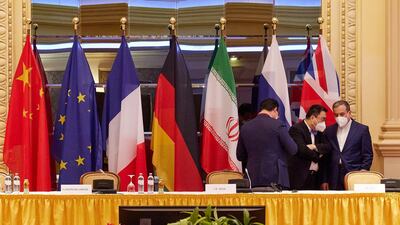Iran can buy time to secretly reconfigure its damaged atomic programme by agreeing to a deal that allows the US to rejoin the 2015 nuclear accord between Tehran and world powers, an expert says.
Sima Shine, the Iran programme leader at the Institute of National Security Studies, said the deal expires in 2030, so its resumption would benefit Tehran's position in the longer run.
"This specific agreement in six, eight years will be finished," she said. "Why should Iran now diverge from the agreement?
"What will happen in 2030? Iran will have the legitimacy to enrich with any number of centrifuges, with any type of centrifuge, to any quantity of enriched uranium.
"If they go back they will continue with the agreement until its last days and at the same time they will prepare everything they need in secret places in order to be in a position where they can openly, and in a very short time, break out into a nuclear military capability."
Ms Shine said the Natanz plant appeared to have suffered significant damage in a recent attack.
Iranian supreme leader Ayatollah Ali Khamenei set a target of 190,000 functioning centrifuges, so Iran will probably return to the agreement as it secretly regroups.
"What was operated in Natanz was a little bit more than 5,000 centrifuges," Ms Shine said.
"I don't know if all of them were destroyed but I would say probably between 40 to 50 per cent.
"It's damaging, it takes the programme back. But if Iran goes back to the agreement, it's less of an issue.
"They have more time to replace everything but it has a huge psychological effect on Iran, on the security established and the leadership."
Iran had announced it was producing uranium at 60 per cent purity, the threshold level for a dash to making a nuclear bomb.
"If Iran has a lot of fissile material enriched to 60 per cent, it's a question of days," Ms Shine said.
The US quit the nuclear deal, in which Iran was to curb its nuclear ambitions in exchange for the lifting of strict, in 2018.
Former president Donald Trump then implemented a policy of maximum pressure through sanctions to contain the regime.
But since Joe Biden became US President in January, Washington's diplomats have returned to indirect talks with Iran to rejoin the deal and lift at least some of the sanctions.
Those talks were intensifying on Tuesday in Vienna and are most likely to be influenced by the expiry of a three-month inspections arrangement between Tehran and the International Atomic Energy Agency on May 20, and Iran's presidential elections in June.
A deal in President Hassan Rouhani's last days would make him a handy scapegoat if the agreement were to sour later.
"I think the leader would prefer to put it on Rouhani ... it would be better to be blamed on someone who is gone," Ms Shine said.
She said the threat Iran poses to the region at the moment – despite endless challenges – would be much worse if it had the ability to produce a bomb.
"Iran is doing everything it is doing today in the Middle East without a nuclear capability, without a strong economy, with demonstrations of people all over the country that dislike the regime," Ms Shine said.











